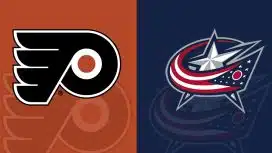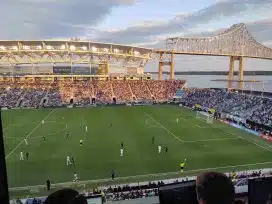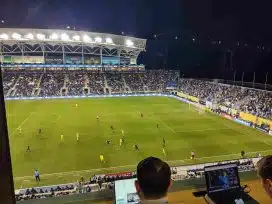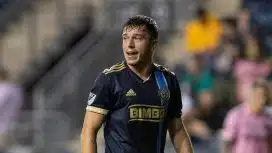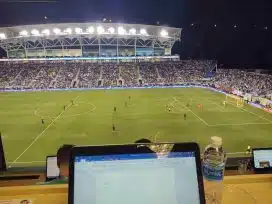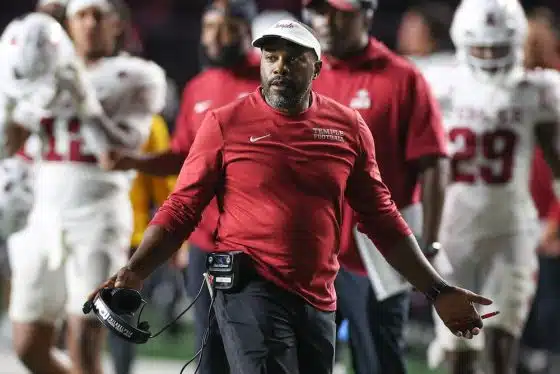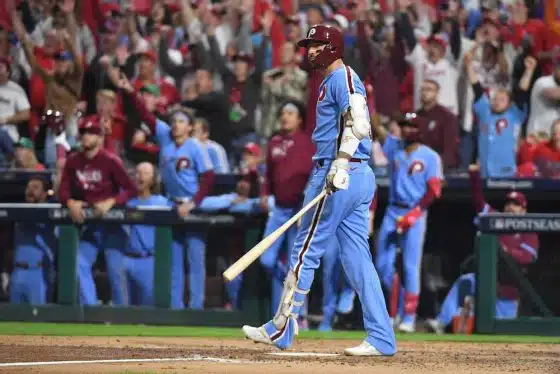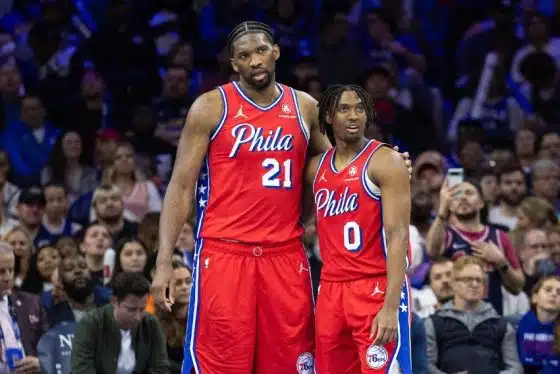Flyers
Series in Review: Flyers-Devils 2000
By Kevin Durso, Sports Talk Philly editor
When the calendar turned to the 21st century and entered the second half of the 1999-2000 NHL season, the Flyers were right in the middle of a period where they were viewed as constant contenders. They had made the playoffs in every season since the 1994-95 season and had made two trips to the conference final before and one Stanley Cup Final appearance. This was their third venture to the Eastern Conference Final in that time.
For a while, it looked like this was a team of destiny. They had erased a 2-0 series deficit and pulled off four straight wins against Pittsburgh to advance. Despite losing Game 1 of this series to the Devils, they found themselves on the cusp of advancing to another Stanley Cup Final.
Then the final three games happened and it was one bad moment after another. In the end, it marked the turning of a page and end of an era and another crushing defeat in the Flyers pursuit to end a Stanley Cup drought that has spanned another 20 years since this series.
Here is a look back at the Flyers series against the Devils from the 2000 Eastern Conference Final.
Game 1: Devils 4, Flyers 1
While the Flyers entered the series riding four straight wins, the Devils got off to the hot start. Just 55 seconds into the game, Scott Niedermayer scored to give the Devils the lead. Mark Recchi tied the game up at 8:20, but the Devils answered back with two quick goals late in the period from Petr Sykora at 17:38 and Bobby Holik 26 seconds later.
That score held until the third. On just the third power play of the game for either team, the Devils put the game away with a goal from Claude Lemieux.
The rest of the game was all about Martin Brodeur. The Flyers put 35 shots on goal in the game and Brodeur was up to the task on all of them following Recchi’s first-period goal, making 34 saves in the Game 1 win.
Game 2: Flyers 4, Devils 3
Just like in Game 1, an early goal set the tone. This time, it was the Flyers cashing in with Rick Tocchet putting home a rebound to make it 1-0 at 1:38. The Devils had an answer at 13:23 of the first with Scott Gomez scoring on a deflection.
The Devils stormed out early in the second, taking five shots in the first two minutes of the period and getting a goal from Jason Arnott with a shot fired from the high slot at 2:51. With 5:10 remaining in the period, Patrik Elias added a goal to make it 3-1 Devils. But late in the second, the Flyers got back into it with a goal by a cutting Eric Desjardins to bring the lead back to one.
Early in the third, Keith Primeau centered for Tocchet, who fired it home to tie the game at three just 1:06 into the period. Just 52 seconds later, the Flyers grabbed the lead with Daymond Langkow firing a shot that was stopped by Brodeur, but the rebound bounced back off a defender and went in to make it 4-3.
Brian Boucher held down the fort the rest of the way, making 30 saves in the game to help th
e Flyers even the series.
Game 3: Flyers 4, Devils 2
The Flyers carried the momentum from Game 2 and turned it into an early goal in Game 3. Just 2:57 into the game, Recchi scored on a backhand off a broken two-on-one. The Devils answered right back, tying the game at 4:24 with a goal by Lemieux. The Flyers re-gained the lead with 5:46 remaining as Keith Jones banged in a rebound to make it 2-1.
Early in the second, Boucher put his stamp on the game with one of the most memorable saves in hockey history. Elias came in on a shorthanded breakaway and went to the backhand, but Boucher threw out his arm and stopped the shot as his mask came off. The lone goal went to the Flyers, as Primeau once again set up Tocchet for a goal that went through the legs of Brodeur to make it 3-1 at 7:15.
With time starting to wind down in the game, the Devils cut the lead to one with Niedermayer get 4:01 to play, but the Flyers took advantage of a fortunate bounce in the neutral zone that allowed Simon Gagne to take control and speed into the offensive zone, tucking the puck to his backhand and finishing the chance with 1:49 to play to cap the scoring and give the Flyers a 2-1 series lead.
Game 4: Flyers 3, Devils 1
Game 4 was the first in the series to not feature an early goal, but the Flyers got on the board first with 3:53 to play in the period from a familiar source. Recchi struck again to give the Flyers a 1-0 lead.
The lone goal of the second came from the Devils, with Holik getting the tally to even things up at 12:13 of the period.
Throughout the third, it was becoming a question as to which team would budge first. An unlikely source for scoring came through for the Flyers. Craig Berube had just 56 career goals in his 14-year career at the time and had just two career playoff goals, but he scored with 7:02 to play to put the Flyers in front. Just like in Game 3, it was Gagne providing the insurance, scoring again with 3:20 left in the third to seal the win and give the Flyers a commanding 3-1 series lead.
Game 5: Devils 4, Flyers 1
With the series going back to Philadelphia and the Flyers in a position to clinch their spot in the Stanley Cup Final, the Devils played the spoiler role well in Game 5. Goals from Arnott on the power play at 10:25 and Holik at 15:15 opened up a 2-0 lead for the Devils through one. Then Sykora made it 3-0 just 1:47 into the second period to extend the lead to three and hand the Flyers an uphill battle.
Valeri Zelepukin cut into the lead at 15:45 of the second period with a power-play goal, but the Devils restored the three-goal lead just 54 seconds into the third with Elias scoring. The Devils were their usual selves defensively, stifling the Flyers and holding them to just 21 shots in the game. Brodeur was on point as well and that meant the series would shift back to New Jersey for Game 6.
Game 6: Devils 2, Flyers 1
Though he was no longer the Flyers captain, Game 6 marked the return of Eric Lindros to the Flyers lineup, but that didn’t help change the result. It took until the third period for any scoring.
The Devils had squandered two power-play chances in the second and the Flyers had their lone chance in the game in the third go by the wayside as well.
Finally, with just 8:34 remaining in regulation, the Devils struck with Lemieux getting another tally on a rebound. With 3:27 to play, Alexander Mogilny made it 2-0 off a turnover and the series appeared to be shifting back to Philly for a Game 7. Lindros got the Flyers on the board with 29 seconds remaining, but it was not nearly enough as the Flyers were held to just 13 shots in the game. It would take all seven games for the series to get a winner.
Game 7: Devils 2, Flyers 1
Back in Philadelphia, the Flyers were trying to avoid being on the wrong side of history and blowing a 3-1 series lead to the Devils and missing their chance to go to the Stanley Cup Final. This was a classic example of the way hockey was in this era. Scoring could be very low and unlike Game 6, it was the Flyers holding the Devils to limited chances.
Low-scoring games provide the opportunity for even the slightest mishap to decide a game, and that’s how this Game 7 went.
The Devils got the first power play of the game at 6:24 and 20 seconds later were on the board with Elias scoring to make it 1-0. With the Flyers down one, Lindros tried to make things happen by using his signature size and speed combination to cut through the neutral zone. He was met at the line with a crushing hit to the head from Scott Stevens, knocking him to the ice and resulting in yet another concussion. Lindros was helped off the ice and done for the game and the series.
As the Flyers continued to hold the Devils to limited chances, they were able to tie the game on a power-play chance of their own with Tocchet scoring at 6:01 of the second to even things up at one.
As the game went into the final minutes, perhaps overtime would be needed to decide the game. But with just 2:32 to play, Elias scored his second of the game on a rebound to give the Devils a 2-1 lead. The Flyers never got a quality chance off in the final minute as the Devils shut them down the rest of the way and the series came to an end.
This was the beginning of the end of an era for the Flyers. It wasn’t the end of the playoff runs — they had another to the conference semi-finals in 2003 and another to the conference final in 2004 — but it marked the last time Lindros was in a Flyers uniform. He remained on the roster into the 2000-01 season, but never played and the Flyers ultimately traded him away.
The Devils went on to win their second of three Stanley Cups in that era with Brodeur as the backstop and others like Stevens, Niedermayer and Elias leading the way.
In a series that featured so much promise and seemed to have so much on their side early, the Flyers crumbled in the final three games, getting just three goals on the Hall-of-Fame goaltender following their Game 4. The Devils as a team played a style that limited opposing offenses and it worked to perfection in the final three games of this series.
While a lot of players remained the same with the Flyers over the coming years, the major change involv
ing Lindros marked a shift in the franchise. This was supposed to be the young leader that would get the Flyers to the league’s peak and break the Cup drought. After snapping a five-year playoff drought, the Flyers reached the conference final in 1995 and came close. They reached the Stanley Cup Final in 1997 and again fell short. It marked the bitter end to a career in Philadelphia that had certainly been fruitful, but ultimately missed the mark on achieving the ultimate goal.
Next up in our Series in Review series, we will look at the series that got the Flyers into the conference final that year, the 2000 Eastern Conference semi-finals between the Flyers and Penguins.










